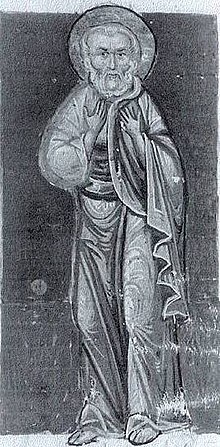Evagrius Ponticus | |
|---|---|
 | |
| The Solitary | |
| Born | 345 Ibora (modern-day İverönü, Erbaa, Tokat, Turkey) |
| Died | 399 Scetis (modern-day Egypt) |
| Venerated in | Syriac Orthodox Church Armenian Church[1] |
| Feast | January 16 (Syrian)[2] February 11 (Armenian)[3] |
| Influences | Origen, Didymus the Blind, Anthony the Great, Macarius of Egypt, Basil the Great, Gregory Nazianzen, Melania the Elder |
| Influenced | Palladius of Galatia, Babai the Great, John Cassian, Isidore of Pelusium, The Tall Brothers (Ammonius, Dioscorus, Eusebius, and Euthymius), Melania the Younger, Rufinus of Aquileia, John of Apamea, Isaac the Syrian, John Damascene |
| Major works | The Kephalia Gnostica, The Praktikos, De Oratione |

Evagrius Ponticus (‹See Tfd›Greek: Εὐάγριος ὁ Ποντικός), also called Evagrius the Solitary (345–399 AD), was a Christian monk and ascetic from Heraclea, a city on the coast of Bithynia in Asia Minor. One of the most influential theologians in the late fourth-century church, he was well known as a thinker, polished speaker, and gifted writer. He left a promising ecclesiastical career in Constantinople and traveled to Jerusalem, where in 383 AD he became a monk at the monastery of Rufinus and Melania the Elder. He then went to Egypt and spent the remaining years of his life in Nitria and Kellia, marked by years of asceticism and writing. He was a disciple of several influential contemporary church leaders, including Basil of Caesarea, Gregory of Nazianzus, and Macarius of Egypt. He was a teacher of others, including John Cassian and Palladius of Galatia.
- ^ Manoogian, Torkom (1969). Divine Liturgy of the Armenian Church. New York: Diocese of the Armenian Church of America. p. 33a.
- ^ Mani Rajan, Corepiscopo (2017). "Martyrs, Saints, and Prelates of the Syriac Orthodox Church".
The feast of St. Evagris (surnamed Ponticus) is celebrated in the Syrian Orthodox Church on 16 January.
- ^ "Evagrius". ldysinger.com.